What to look for in Alabama on Super Tuesday
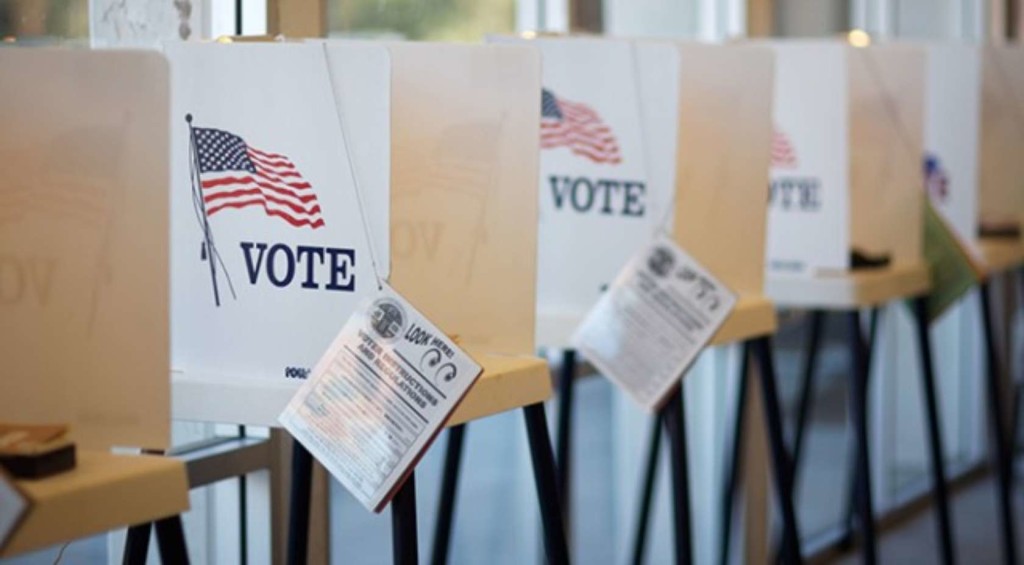
Alabama voters go to polls Tuesday as part of Super Tuesday contests in 12 states. Hillary Clinton, Ted Cruz, Marco Rubio and Donald Trump all plan stops in Alabama in a last-minute hunt for votes before Tuesday’s election. Republicans and Democrats will also name their picks in congressional and state races. Here’s a look at what to watch for and a look at a few of the key races on Tuesday: • • • CONGRESS On Tuesday, Rep. Martha Roby, R-Montgomery, faces Tea Party challenger Becky Gerritson in the second congressional district that includes Montgomery and the Wiregrass. Roby is perhaps best known for being on the congressional panel investigating Benghazi and has been a vocal critic of delays and problems at Veterans’ Affairs hospitals in the region. Roby said she shares voter frustration with “Washington doublespeak.” “There are so many politicians out there that are so afraid of losing their jobs that they forget to do their jobs. My job is to listen to the people, study the issues, make decisions that are in the best interest of the people I represent and to be honest about it,” Roby said in an interview. Gerritson is the founder of Wetumpka Tea Party, one of the state’s largest and most active tea party organizations. She appeared on the national radar with emotional congressional testimony in 2013 regarding Internal Revenue Service probes of conservative political groups. “We need a true conservative in leadership for District 2,” Gerritson told voters at a campaign stop. “We see year after year, election after election, we are promised that things are going to change and they don’t,” Gerritson said. In South Alabama, Rep. Bradley Byrne is in a rematch with Dean Young, the bombastic real estate developer he bested three years ago for the open congressional seat. Byrne has a heady mix of endorsements ranging from the NRA, the U.S. Chamber of Commerce and Sen. Jeff Sessions. Young is running an ad of clipped-together news segments from their last race. News commentators refer to Byrne as the “establishment” candidate eight times in the 30-second spot. While any anti-establishment surge could hurt incumbents, challengers from the party’s far right, like Young and Gerritson, struggle under a compressed campaign season while facing opponents with superior name recognition and financial firepower. Five-term Sen. Richard Shelby is running an aggressive campaign, unloading a portion of a $19 million war chest, as he looks to a sixth term in office in the midst of the insurgent voter mood. Shelby faces off with four lesser known challengers in the GOP primary, most notably Jonathan McConnell, a former Marine who now runs a ship security business putting former Marines on vessels. • • • PUBLIC SERVICE COMMISSION PRESIDENT One of the few statewide races on the ballot is the Republican primary for president of the Public Service Commission. The race pits incumbent Twinkle Andress Cavanaugh against former PSC member Terry Dunn. • • • BRING PHOTO ID This will be the first presidential race under Alabama’s new photo identification requirement for voting. Alabama requires voters to show photo identification at the polls such as a driver’s license, passport, an Alabama non-driver ID, a university student ID or identification issued by the federal government. A person without photo ID can submit a provisional ballot, but it won’t be counted unless they bring in the required identification. • • • TURN THE BALLOT OVER Voters should remember to look on the back of the ballot. The presidential candidates and numerous delegates to party nominating conventions appear on the front of the ballot, while state and local offices are on the back. Republished with permission of the Associated Press.
Marco Rubio donor meeting raises possibility of brokered convention

Facing unsteady ground as Super Tuesday approaches, Marco Rubio is bracing for the prospect of a brokered Republican Convention in Cleveland this July. CNN reports on a closed-door meeting with about 200 Rubio supporters and donors Wednesday evening, where the campaign considered options as a stopgap measure against the nominations of either GOP front-runner Donald Trump or Ted Cruz. According to two people at the private event, Terry Sullivan, Rubio’s top adviser, used a PowerPoint presentation and question-and-answer session to outline two possibilities for the Florida senator to secure the Republican nomination. “One is somebody — Trump or Rubio — wins enough primaries to sew up the nomination in advance of the convention,” one attendee told CNN. “The other is that nobody does, and the two candidates go to the convention.” The campaign is working overtime to convince potential donors that Rubio is the viable establishment alternative to either Trump or Cruz, and that he has a legitimate path to victory. Yet Trump is the one approaching the Super Tuesday primaries March 1 as the undisputed Republican front-runner, with decisive wins in New Hampshire, South Carolina and Nevada. Rubio, in comparison, has yet to win a single state. Although only hypothetical at this point, a brokered convention seems increasingly conceivable, particularly in light of Rubio’s Wednesday meeting. Nevertheless, the attendees said Sullivan remains confident that Rubio would win in Florida, despite recent polling showing him lagging behind Trump. One major question shadowing the entire event was whether giving to the Rubio campaign would not be a waste of money, as it was with for Jeb Bush, who exited the race last week after a poor showing in South Carolina.
Marco Rubio to headline Samford University forum Saturday

Republican U.S. Sen. Marco Rubio is set to be the solo headliner at Samford University’s Republican presidential candidate forum Saturday after fellow presidential candidate Sen. Ted Cruz cancelled. Three other Republicans in the race, businessman Donald Trump, Ohio Gov. John Kasich and pediatric neurosurgeon Ben Carson are also skipping the event. The forum is one of the last opportunities for candidates to plead their case to Alabama voters ahead of Super Tuesday next week, when Alabama and a dozen other states hold nominating elections. Event organizer Yellowhammer News said the sold-out event will still go on as planned, despite Rubio being the only candidate in attendance. Cruz’s cancellation came down from a political consultant not long after a new poll put out by Birmingham-based consulting firm Master Image showed the Texas senator in a third place among Yellowhammer State voters. The poll, released Wednesday, put Trump in the lead with 36 percent, followed by Rubio with 19 percent. Cruz got 12 percent support, with Carson taking 8 percent and Kasich landing in last place with 7 percent. About 17 percent of the 1,556 Alabama Republicans polled said they were still undecided. The poll may foreshadow a disappointing Tuesday for Cruz, whose campaign strategy relies on picking up delegates in the “SEC Primary” states, where evangelicals have a larger role at the polls. The junior senator from Texas had 17 percent support among Alabama Republicans in January, but his numbers had slipped to around 13 percent this month.
Donald Trump takes 17-point lead in new state poll

With the SEC Primary less than a week away, billionaire businessman Donald Trump has a commanding lead in the Yellowhammer State, according to an independent poll of Alabama’s Republican presidential primary. Master Image, a Birmingham-based Republican consulting firm, released a poll Wednesday showing Trump with 36 percent, Florida Sen. Marco Rubio at 19 percent, Texas Sen. Ted Cruz at 12 percent, former neurosurgeon Ben Carson at 8 percent and Ohio Gov. John Kasich at 7 percent, with undecided voters accounting for another 17 percent of those polled. “Trump’s popularity in Alabama continues the trend we see elsewhere,” said president and owner of Master Image Inc. Joe Sanders. “Trump’s numbers in Alabama appear to be a few points lower than other Southern states, but in line with what should happen on March 1, considering almost one-in-five voters remain undecided.” The poll, first reported by the Daily Caller, was conducted Tuesday of 1,556 Alabama Republicans with a 4.2 percent margin of error. Rubio is scheduled to visit both Birmingham and Huntsville Saturday. Trump will be in Huntsville on Sunday. No other GOP candidates are currently scheduled to visit the state ahead of Tuesday’s primary election.
Leading GOP candidates to campaign in Alabama this weekend
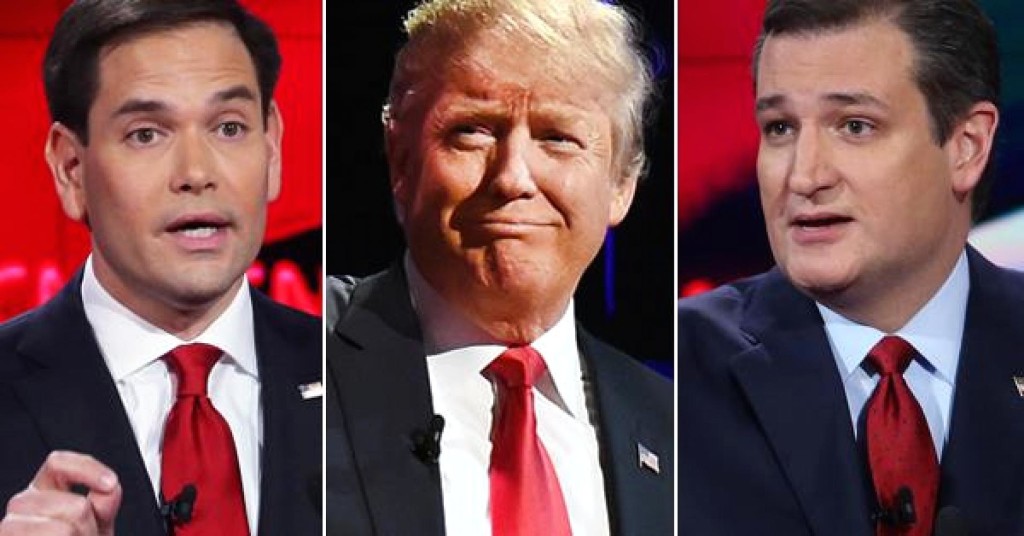
The Alabama secretary of state’s office says three leading Republican presidential candidates will visit Alabama before next week’s Super Tuesday primaries. Senators Ted Cruz and Marco Rubio are scheduled to speak at a forum Saturday in Birmingham. Each candidate will be interviewed individually at Samford University’s Wright Center. Donald Trump is scheduled to visit Huntsville on Sunday, his third campaign stop in the state this election cycle. Secretary of State John Merrill says he is “thrilled” candidates are visiting Alabama to interact with voters. Alabama has joined other Southern states in a so-called “SEC Primary” on March 1 to try drawing more interest in the region from presidential candidates. Republished with permission of the Associated Press.
Ted Cruz, Marco Rubio and John Kasich all face must-wins in home states
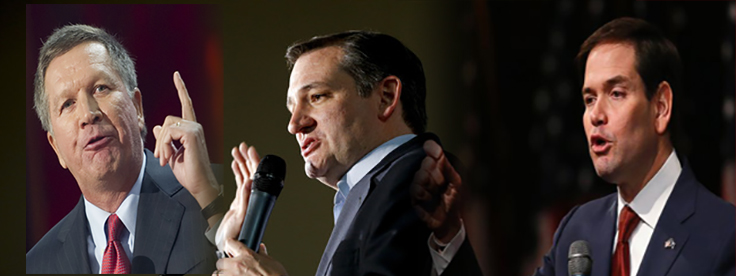
In their efforts to derail Donald Trump from the Republican presidential nomination, Texas Sen. Ted Cruz, Florida Sen. Marco Rubio and Ohio Gov. John Kasich are all facing enormous pressure in their home state primaries, which account for about a fourth of the delegates up for grabs in the next three weeks. Failure to defend their turf could leave each explaining what states they can win going forward — and make the New York billionaire look all the more inevitable. After Trump’s impressive win in Nevada, the presidential race now shifts to Super Tuesday, featuring 11 largely Southern states, including Texas, with 155 GOP delegates. Those delegates will be awarded proportionally. On March 15 will come primaries in Florida, with 99 delegates, and Ohio with 66, and they are winner take all. If no one can dent Trump’s advantage by then, the race for the nomination may be all but over. But home states have buoyed candidates in the past. Four years ago, eventual GOP nominee Mitt Romney used his native Michigan to quash a surprisingly stout challenge from Rick Santorum. Newt Gingrich won his home state of Georgia and neighboring South Carolina but did little elsewhere. Of the trio with looming home-state primaries, Cruz may be in the strongest position. “I wanna say, I cannot wait to get home to the great state of Texas,” Cruz said Tuesday night after losing in Nevada to Trump. “Tonight, I’ll sleep in my bed for the first time in a month.” But Cruz will have to win more than just Texas on Tuesday if he doesn’t want to be looking up at Trump in the delegate count. Kasich and Rubio, meanwhile, may be battling for many of the same votes from traditional Republicans uneasy with the bombastic Trump and the firebrand conservative Cruz. As long as both remain in the race, they could continue to split the establishment bloc. And they’ll have to run Tuesday’s gauntlet before they can even reach must-wins at home. The home-state jockeying is underway. ___ FLORIDA Current and former members of Congress from Florida who had been backing Jeb Bush signed on with Rubio this week after the ex-governor left the race. That’s not to say Rubio’s a slam dunk in his state. Trump is the only Republican still in the race who had an obvious campaign presence in Florida — office space and paid employees on the ground — as of late last month. Trump is a part-time resident. Bush also was building a Florida operation and some of that may flow to Rubio. “Now that Jeb is out of the race, that helps Marco tremendously,” said Marcelo Llorente, a former Republican legislator in Florida who knows both men well. Cruz strategist Jason Johnson released a memo arguing that if Rubio’s hopes are built around winning Florida, that won’t work because almost half of the delegates needed to win the nomination will have been awarded by then. “That’s an even less plausible path to victory than Mayor Rudy Giuliani‘s ‘wait for Florida’ strategy in 2008,” Johnson said, referring to Giuliani’s short-lived presidential run. But Johnson’s argument presumes Rubio won’t do well Super Tuesday. ___ TEXAS The Texas senator has spent more time in the South than his rivals and built networks of supporters he hopes can not only help him in Texas but also nearby states. That approach did not work in South Carolina, the only Southern state where it has been tested. Cruz has for years been considered his state’s most popular politician and Gov. Greg Abbott is his friend, mentor and ex-boss — although Abbott has so far held off making a presidential endorsement. Cruz also has the backing of former Texas Gov. Rick Perry and current Lt. Gov. Dan Patrick, along with nearly one-fourth of the Republicans representing Texas in Congress and about half of the Republicans in the state Legislature. He’s also built a strong ground game, boasting 27,000 volunteers, but a similarly strong organization didn’t spell victory in South Carolina. Texas may not have a decisive winner, unless the top candidate can get a majority of the votes cast statewide and in each congressional district. Otherwise, delegates will be awarded proportionally based on full-state results and results in each district. The only campaign or outside group advertising in Texas so far supports Rubio. Ads by the Conservative Solutions PAC tag Cruz as “calculated, underhanded.” Still, polls suggest Cruz is the favorite. “He’s a native-son candidate,” GOP strategist Matt Mackowiak said. “Support for him is very strong.” ___ OHIO Kasich is looking to the Midwest and Michigan’s March 8 primary to help carry him through to his neighboring home state a week later. His bid for the nomination is already a longshot and whatever viability he might have now surely would vanish if he faltered in Ohio. A new Quinnipiac survey has Kasich lagging Trump but within 5 percentage points of him, marking progress for the governor. Kasich brushes off any notion he may not win his state. “The last thing I’m worried about is how we’ll do in Ohio,” he said Tuesday. Republished with permission of the Associated Press.
How the Nevada presidential caucuses work
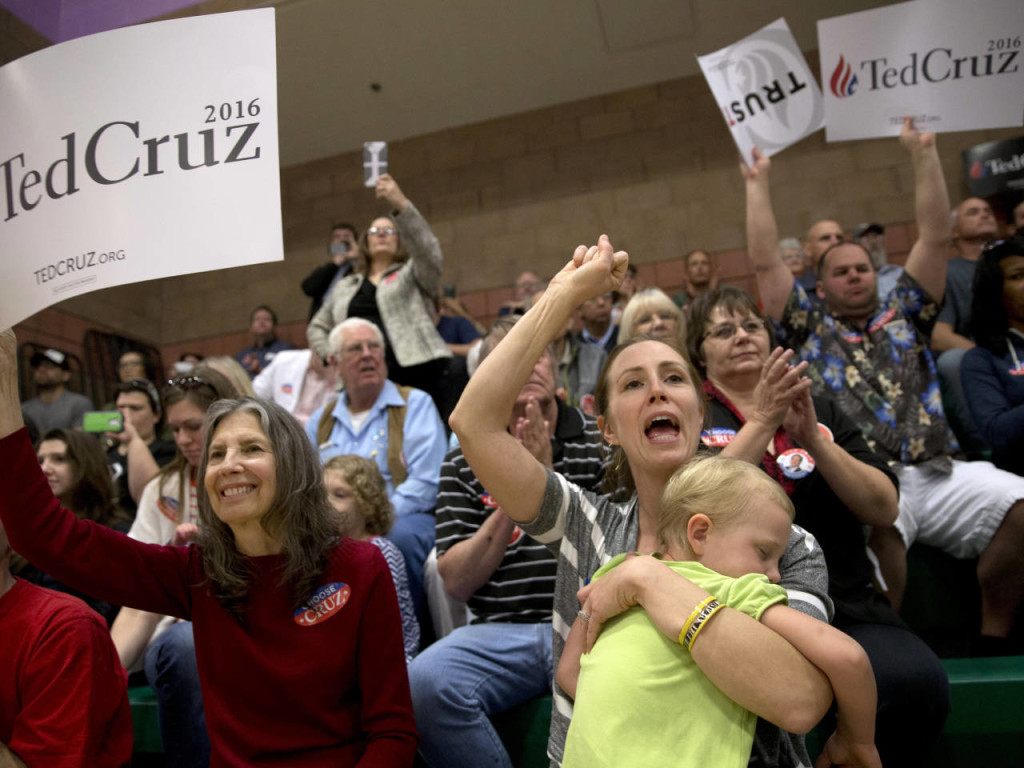
With a population of just 3 million, Nevada became one of the first four states in the presidential nominating process thanks to an effort a decade ago to add more diversity to the early voting calendar. Nevada is now a frequent stop for candidates in both parties, though it doesn’t draw nearly the amount of campaign traffic seen in Iowa and New Hampshire. A little history about the Nevada caucuses — which was held for Democrats on Saturday and will take place for Republicans on Tuesday — and a brief description of how the event works: HOW IT STARTED Eleven states applied to the Democratic National Committee in 2006 for early-state status. Nevada’s delegation pitched the state as a reflection of the country’s changing population. And it didn’t hurt that Harry Reid, the highest-ranking Democratic senator, lobbied for his home state. Ultimately, Nevada and South Carolina won out over Alabama, Arizona, Arkansas, Colorado, Washington, D.C., Michigan, Mississippi, Nebraska, West Virginia and Hawaii. About one-quarter of Nevada’s population is Hispanic, and registration leans just slightly in favor of Democrats. Republicans moved their Nevada caucuses up on the calendar so they don’t take place too long after the Democratic caucuses. ___ HOW IT WORKS Unlike a primary, which involves quick and solitary voting, caucuses generally involve a more public pronouncement of presidential preference. Caucus-goers mainly meet in schools, community centers and places of worship in Nevada’s 17 counties, and give speeches to try to persuade their undecided neighbors. Republicans have more than 1,700 precincts and more than 130 caucus locations. Nevada’s weeknight Republican caucuses are the fourth contest in the nation for the GOP, behind South Carolina, which took place last Saturday. Nevada’s late-morning Democratic caucuses held Saturday were third in line for their party, before South Carolina. ___ WHY ARE CAUCUSES ON DIFFERENT DAYS? Caucuses are run by the parties, not by any governmental entity, and Democrats and Republicans set their schedules somewhat independently from each other. National and local party officials work together to set the national nominating calendar. Nevada Republicans didn’t want to hold their caucuses on Feb. 20 because South Carolina had its primary the same day. Holding the two contests simultaneously could force candidates to choose between campaigning in one state or the other. The party also didn’t want to schedule caucuses next Saturday, just a few days before a dozen states vote on Super Tuesday, because candidates would be more likely to ignore small Nevada and focus on the bigger states casting ballots on March 1. ___ THE REPUBLICAN WAY Republicans and Democrats run their caucuses differently, including on the matter of voter registration. While Democrats allow same-day, on-site voter registration in an effort to open caucuses to a wider group of people, Republicans must register 10 days in advance of the caucus to participate. GOP officials argue that same-day registration opens the process to fraud because people might register and cast ballots in multiple locations before authorities could catch on to double-voting. Republican caucus-goers can listen to speeches from candidate representatives before marking their favorite candidate on a paper ballot, or they can ignore the speeches and simply turn in their ballot and leave. GOP caucuses must start after 5 p.m. on Tuesday and end before 9 p.m. Nevada sends 30 delegates to the Republican National Convention, and they’re awarded proportionally based on how each candidate performs on Feb. 23. ___ IS NEVADA A BELLWETHER? In the short history of early and contested Nevada caucuses, voters favored two nomination losers (Hillary Clinton and Mitt Romney in 2008) and one winner (Romney in 2012). The state is the first substantial test of candidates’ support with Hispanic voters. ___ WHAT ROLE DOES SHELDON ADELSON PLAY? The GOP kingmaker and billionaire Las Vegas casino mogul, who spent more than any other donor in the 2012 campaign cycle, hasn’t made it clear which candidate he’s supporting this time around. An Adelson spokesman said the family won’t discuss their political activities, while the latest Federal Election Commission records show Adelson has so far personally given to both Marco Rubio and Ted Cruz, as well as two candidates who have already bowed out: Jeb Bush and Lindsey Graham. While some have been tempted to draw parallels with Rubio’s recent endorsement by the Adelson-owned Las Vegas Review-Journal newspaper, the newspaper’s Feb. 5 editorial insists independence from Adelson input, and noted it met with Rubio back in October, before the paper’s secretive, much-scrutinized sale to the family. ___ A ROCKY ROAD Unlike in Iowa, caucuses are not a part of the political fabric of Nevada and political operatives must educate voters on how to participate. Campaigns and parties are holding many training sessions so voters won’t be intimidated by the process. Republican turnout was paltry in 2008 and worse in 2012, when only 33,000 voted. That’s a far cry from the 182,000 Republican caucus participants this month in Iowa, which is about the same size as Nevada. Caucus organizers also took three days to release official results from the 2012 Republican contest, after they had trouble with the count. Other states are eager to snatch away Nevada’s coveted “first in the West” position, and Nevada could lose early state status if organizers bungle the process or if the state continues to post unimpressive turnout numbers. ___ Republished with permission of the Associated Press.
Marco Rubio builds momentum; Ted Cruz struggles
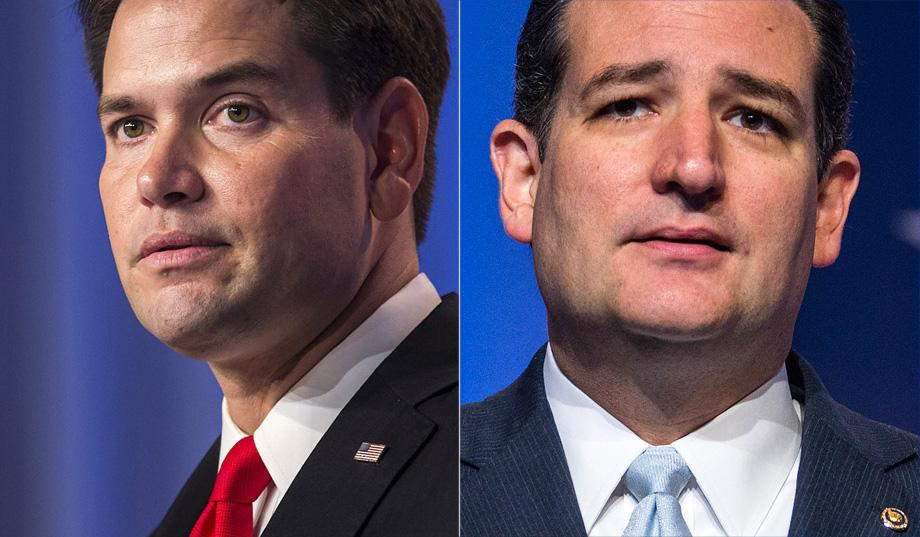
Marco Rubio amassed increasing support for his candidacy while Ted Cruz’s campaign showed signs of struggle as Republican presidential candidates crisscrossed Nevada on Monday on the final day of campaigning ahead of the state’s GOP caucuses. Cruz told reporters Monday he has asked his campaign spokesman, Rick Tyler, to resign for tweeting a story that falsely alleged Rubio insulted the Bible. “We are not a campaign that is going to question the faith of another candidate for president,” he said, calling Tyler “a good man” and noting that he deleted the tweet once he discovered it was false. Tyler did not return telephone, text or email messages left by The Associated Press seeking comment. It’s not the first time that Cruz’s campaign has been accused by rivals of using questionable tactics. Cruz apologized to GOP hopeful Ben Carson earlier this month after his campaign promoted a news story suggesting that Carson was getting out of the race. Cruz’s campaign also has acknowledged creating a website that used a computer program to create a fake picture of Rubio shaking hands with President Barack Obama. Speaking during a campaign stop in Elko, Nev., earlier Monday, Rubio criticized Cruz for the incident and asked whether Cruz would fire anyone involved. “It’s every single day something comes out of the Cruz campaign that’s deceptive and untrue, and in this case goes after my faith,” Rubio told reporters when asked about the incident. “I guess one of their spokespersons apologized, and I accept their apology.” Republican front-runner Donald Trump lashed out at Cruz over Twitter on Monday, saying that Cruz “has now apologized to Marco Rubio and Ben Carson for fraud and dirty tricks. No wonder he has lost Evangelical support!” He reiterated his calls for disqualifying Cruz because of “his fraudulent win in Iowa.” Trump was scheduled to have two rallies in Nevada – one in Elko and another later in Las Vegas. Meanwhile, establishment heavyweights continued to back Rubio, with many saying they see him as the candidate who can unite a disharmonious Republican Party. Arkansas Gov. Asa Hutchinson and Utah Sen. Orrin Hatch were the latest to endorse Rubio. Former Sen. Bob Dole told ABC News on Monday that he, too, had been backing Bush, but he’s now supporting Rubio. Ohio Gov. John Kasich, who finished second in New Hampshire’s Republican primary, won the endorsement of Tom Ridge, a former Homeland Security secretary and Pennsylvania governor. Kasich’s campaign says Ridge is signing on as a national co-chairman. Democratic presidential hopefuls coming off a tight battle for Nevada kicked off the week on opposite ends of the country Monday. Hillary Clinton was fundraising in northern California, while Bernie Sanders had a rally in Massachusetts, another Super Tuesday state. South Carolina votes in the next Democratic primary Saturday. Republished with permission of the Associated Press.
Ted Cruz spox resigns over fake Marco Rubio Bible insult

Republican presidential candidate Ted Cruz has asked his campaign spokesman to resign for tweeting a story that falsely alleged Marco Rubio insulted the Bible. Cruz tells reporters he asked for Rick Tyler‘s resignation. Rubio has blasted Cruz for the incident and asked whether Cruz would fire anyone involved. Cruz says Tyler is “a good man” and deleted the tweet once he found it was false. Cruz is telling reporters: “We are not a campaign that is going to question the faith of another candidate for president.” Republished with permission of the Associated Press.
Time is running out for Donald Trump’s rivals to stop him

Donald Trump‘s rivals are running out of time to stop him after his dominant performance in South Carolina. A close look at the election calendar suggests that if the New York billionaire’s rivals don’t slow him by mid-March, their only chance to deny him the Republican presidential nomination may be a nasty and public fight at the party’s convention this summer. “When you look at it right now, it looks like there’s this juggernaut,” said Rich Beeson, a senior aide to one of Trump’s main rivals, Florida Sen. Marco Rubio. The reason is delegates and how they’re awarded. Winning states generates headlines, but the nomination is earned by collecting a majority of the delegates awarded in primaries and caucuses. Next up: Nevada’s caucuses on Tuesday. This year, most contests award delegates proportionally, based on each candidate’s share of the vote. Beeson and strategists for other campaigns argue that could make it hard for Trump to build a big lead because even the second- and third-place finisher can win delegates. If one candidate can run up a significant lead, as Trump has begun to, then proportional contests also make it difficult for rivals to catch up. South Carolina is the perfect example of this problem for Rubio and Texas Sen. Ted Cruz. The state isn’t winner-take-all when it comes to delegates, but Trump’s strength in all parts of South Carolina allowed him to haul in all 50 delegates awarded in Saturday’s primary. Trump now has 67 delegates. Cruz and Rubio took home none from South Carolina, leaving them with a total of 11 and 10, respectively. Trump is well on his way, and he knows it. “Folks, let’s go, let’s have a big win in Nevada, let’s have a big win in the SEC,” Trump said in his South Carolina victory speech, referring to the states with universities in the Southeastern Conference that will vote next month. “Let’s put this thing away.” Only a small fraction of the delegates to be won in the GOP primary season, which began Feb. 1 in Iowa and ends June 7 in California and a handful of other states, have been awarded to date. But some of Trump’s opponents acknowledge he could build an insurmountable lead by mid-March if current trends continue. “There are going to be a lot of circumstances where we can declare some victories and at least get this thing to March 15,” Beeson said. “Once we get to March 15, if the die has not been cast by then, it’s a different game.” Why March 15? That’s the first day on which the GOP’s rules allow states to hold a winner-take-all contest. Florida will award 99 delegates that day, while Ohio will give out 66. The Missouri primary is that day, too. Like South Carolina, Missouri awards a pot of delegates to the statewide winner, as well as three delegates each to the winner of each congressional district. That makes it possible for one candidate to win all of Missouri’s 52 delegates, or at least a large majority. Put simply, it’s a day in which a candidate running second to Trump could catch up. Or fall even further behind. Altogether, there are 14 such contests on the GOP primary calendar, offering a total of 752 delegates. That’s not enough delegates to claim the nomination; it takes 1,237. But if one candidate wins most of those states, he could build a lead too big to overcome. In the modern political era, a candidate usually wins enough delegates to emerge as the presumptive nominee several weeks — or even months — before the end of primary voting. That happens when the candidate claims so many delegates it’s all but impossible for anyone else to catch up. But the nomination isn’t formalized until the party’s presidential nominating convention, scheduled for July this year. The last time the Republican nomination wasn’t decided before the convention was 1976. Yet some of Trump’s rivals are already talking about the possibility of a “contested” convention as they envision a series of second- or third-place finishes in the upcoming GOP primaries. Rubio’s campaign manager, Terry Sullivan, recently told The Associated Press, “I would be surprised if it’s not May or the convention” when the party settles on its nominee. At the convention, a lead in the race for delegates guarantees nothing if the candidate doesn’t have an outright majority, said Ben Ginsberg, a leading Republican election attorney. Under most state party rules, delegates are only required to vote for their candidate on the first ballot at the convention. “If no one comes into the convention with a majority of delegates, then all bets are off,” Ginsberg said. “You’re dealing with a potentially unruly and independent group of people.” Republished with permission of the Associated Press.
Marco Rubio, Ted Cruz jostle to claim ‘alternative-to-Donald Trump’ vote
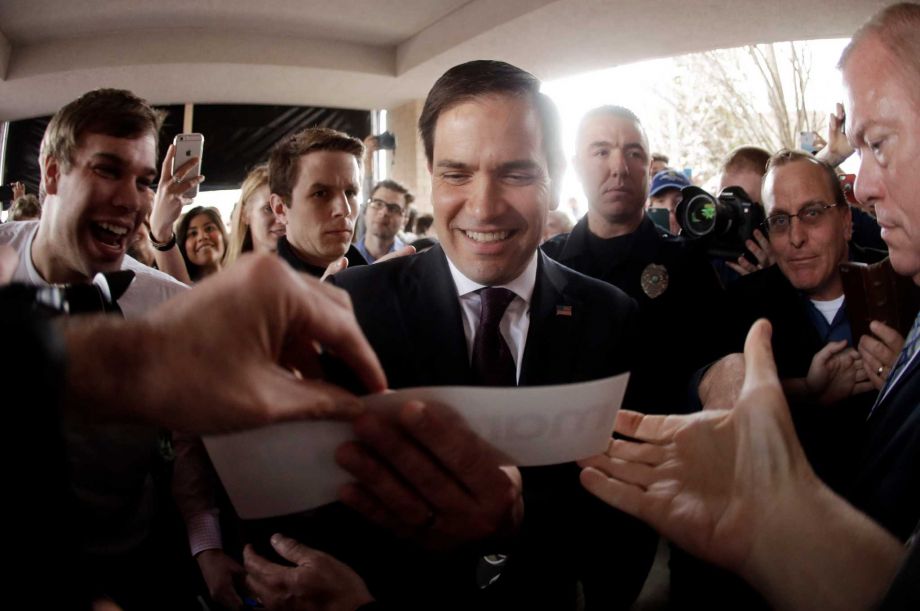
Republicans Marco Rubio and Ted Cruz battled to emerge as the true anti-Trump on Sunday as the billionaire businessman took an ever-so-brief break from his trademark braggadocio to say his drive for the GOP nomination isn’t unstoppable — yet. Fresh off a commanding victory in South Carolina, Donald Trump declined to say the nomination was his to lose. But he quickly went on to declare, “I’m really on my way.” Soon enough, in a television interview, he was toting up electoral math all the way through Election Day and concluding, “I’m going to win.” The candidates’ diverging flight plans demonstrated how the campaign spreads out and speeds up now. Nevada’s GOP caucuses are Tuesday, and then a dozen states vote in the March 1 Super Tuesday bonanza. Trump was in Georgia exulting over his latest victory, Cruz headed for Nevada, and Rubio embarked on a Tennessee-Arkansas-Nevada trifecta. On the Democratic side, Hillary Clinton savored her weekend win in the Nevada caucuses as Bernie Sanders acknowledged that while his insurgent campaign has made strides, “at the end of the day … you need delegates.” He looked past Tuesday’s Democratic primary in South Carolina to list Colorado, Minnesota, Massachusetts and Oklahoma as places where he has a “good shot” to do well. Rubio and Cruz used the Sunday morning news shows to spin rosy-road-forward scenarios after complete but unofficial returns in South Carolina put Trump way up top, with Rubio squeaking past Cruz for second. But with roughly 70 percent of Republicans in national polls declining to back Trump, Cruz and Rubio tried to cast themselves as the one candidate around whom what Rubio calls the “alternative-to-Donald-Trump vote” can coalesce. Rubio also took an aggressive run at Trump, faulting him for a lack of specifics on policy. “If you’re running for president of the United States, you can’t just tell people you’re going to make America great again,” he said on CBS’ “Face the Nation.” At a later rally in Franklin, Tennessee, a Nashville suburb, Rubio took note of the smaller GOP field after Jeb Bush‘s departure from the race, and celebrated his biggest crowd of the campaign, estimated at more than 3,000 people. Rubio avoided criticizing his GOP rivals, instead highlighting his efforts to help middle-class families. Cruz, for his part, stressed his conservative bona fides and said he was the lone “strong conservative in this race who can win. We see conservatives continuing to unite behind our campaign,” he told NBC’s “Meet the Press.” With Bush gone from the race, Rubio was hoping to pick off past donors to the Bush campaign and looking to benefit as well from a cessation in the millions of dollars in negative ads run by the Bush campaign and its allies. Rubio also suggested it was only a matter of time before John Kasich and Ben Carson folded as well. He hinted it would be better to get that winnowing over with, saying, “the sooner we can coalesce, the better we’re going to be as a party in general.” Not so fast, Kasich countered. “We’re getting big crowds everywhere we go,” the Ohio governor insisted, listing Vermont, Massachusetts and Virginia as places he can shine. Cruz tried to brush right past his apparent third-place finish in South Carolina and instead hark back to his victory over Trump in leadoff Iowa. “It is becoming clearer and clearer that we are the one campaign who can beat Donald Trump,” Cruz told reporters before a campaign stop in rural Nevada. The Texas senator said his path to victory calls for a strong showing on Super Tuesday, and that Texas was “clearly the crown jewel” of that day. Rubio, a Florida senator, highlighted the big delegate take available in the five-state round of voting on March 15, which includes his home state. He noted that round offers victors a “winner-take-all” share of delegates rather a proportional share. Cruz scoffed at Rubio’s strategy, saying: “They’re trying to wait until March 15 to win a state.” Trump suddenly had nice things to say about Bush, the candidate he had hammered so relentlessly when they were rivals. As for Rubio, Trump told “Fox News Sunday” that “I start off liking everybody. Then, all of a sudden, they become mortal enemies.” At a rowdy Atlanta rally, Trump crowed over his big South Carolina win, saying “we’re just doing one after another.” Spitting out the superlatives, he called his sweep of all 50 delegates there “amazing,” ”beautiful,” ”conclusive” and “very, very decisive.” Clinton was happy with her Nevada win but acknowledged she has work to do in persuading voters that she has their best interests at heart. “I think there’s an underlying question that maybe is really in the back of people’s minds and that is, you know, is she in it for us or is she in it for herself?” Clinton said on CNN. “I think that is a question that people are trying to sort through.” Working to increase his support among black voters, Sanders visited a Baptist church luncheon following services in West Columbia, South Carolina, and talked up the country’s economic recovery under President Barack Obama. Republished with permission of the Associated Press.
Marco Rubio brings optimistic conservative message to Sunday shows
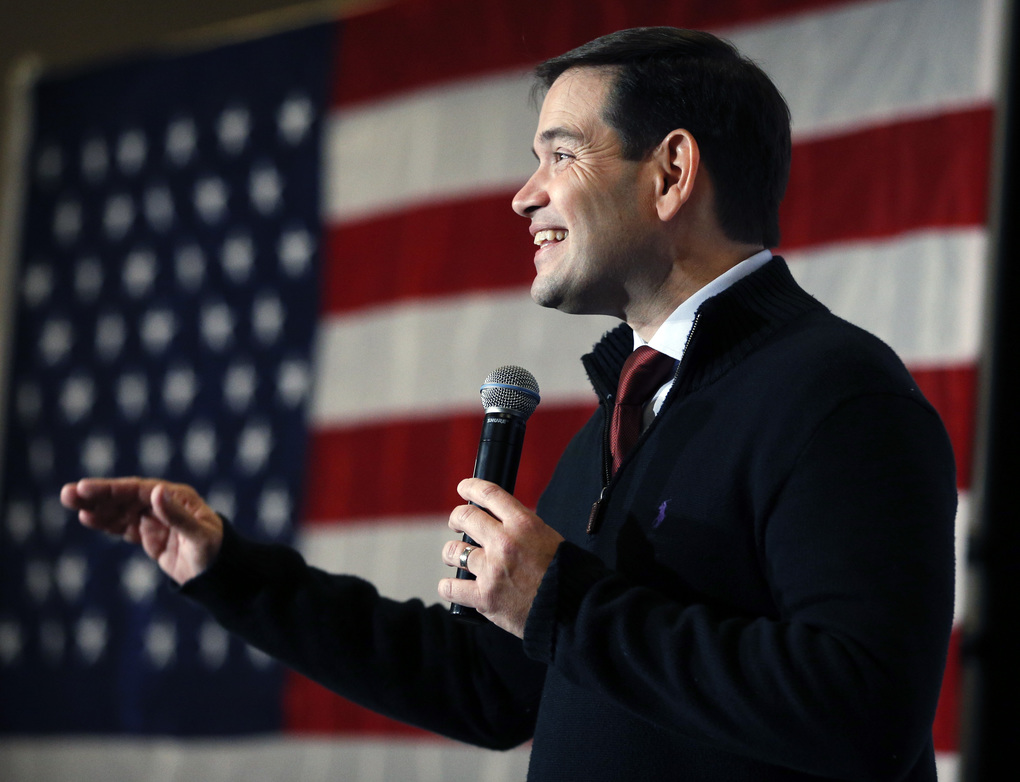
On all four broadcast network Sunday shows, Marco Rubio attempted to position himself as the “optimistic conservative” in a three-man race for the GOP nomination. On Meet the Press, Rubio was asked why he should “feel good” about coming in a “distant second” in South Carolina. Rubio’s answer boiled down to being the logical alternative to Trump. “Seventy percent of Republicans want someone other than Donald Trump as the nominee” and “more and more, that ‘alternative to Trump’ vote is coming to us.” Rubio asserted that Trump will find it increasingly hard to “crowd people out” with “outrageous statements” as the field narrows, leaving an opening for his campaign which is “very realistic about the challenges” ahead, yet “very optimistic about the future.” Rubio was asked about his previous immigration position, one that synced up neatly with that of the President, as a relatively devastating attack ad that had Rubio and Obama talking points paralleling each other indicated. “People don’t care about it,” Rubio said, “it doesn’t matter.” Rubio pivoted to his proposed course of action now: the “only way forward is by doing it in pieces,” and that first piece is “securing the border.” Rubio then discussed his national strategy going forward, headed into Super Tuesday, stopping short of guaranteeing an outright win anywhere, while insisting his was a “national campaign.” “All of these states award delegates differently,” and the Winner Takes All states are “where we need to win.” On Fox News Sunday, Rubio likewise was on message, saying that the narrowing field will allow “the remaining 70 percent [of non-Trump support] to coalesce” as the field shrinks to three “full-scale national campaigns.” Rubio pushed the narrative of Reaganesque optimism when asked to compare his effort to Trump’s, saying his presentation was “very optimistic about the future” with “real answers to real problems,” as opposed to Trump’s constant messaging about “how bad things are.” “I look forward to having a policy debate,” Rubio said, “if we can make it” one. Rubio also addressed Ted Cruz, who is “very weak on national security,” and whose campaign “tenor” has “voters increasingly troubled.” When asked if Cruz had the integrity or character to be President, Rubio noted that “from his campaign it’s missing,” citing robocalls in South Carolina that charged that Rubio was cutting his campaign short and would end it altogether if he didn’t win South Carolina. Rubio also messaged against the attendance-record criticisms that have simmered around his stints in the Florida House and the Senate. In the House, he said being majority whip necessarily hampered his ability to make some committees, such as the special committee on 9/11 related issues. And in the Senate, scheduling likewise was a burden. Often, he said, “three committees are meeting at the same time,” making it hard to “be at every hearing” when another committee “could be having votes. ABC’s This Week offered some variations on the theme. Rubio addressed Trump’s recent retweet that Rubio and Cruz may face eligibility issues related to being native born, by pointing out the media coverage of every time “Trump says something edgy and outrageous,” a tactic that’s “not working with the narrowing field.” Regarding why he hasn’t gone on the offense against Trump, Rubio kept it positive, saying the “election’s about who is most capable of leading” the party, before casting doubt on Trump’s ability to lead on day one. “Putin’s not going to [provide] a six-month honeymoon period,” Rubio said, adding that the “world’s not going to wait” for Trump to get his bearings. Rubio also was asked if Mitt Romney was poised to endorse him, a meme floated by the Huffington Post. Romney, Rubio said, is “not scheduled to endorse me,” which is a nice turn of phrase, and that added that “if he were, we wouldn’t announce it on the Huffington Post.” Rubio brought his message to Face the Nation, reiterating his contention that 70 percent of the GOP electorate is up for grabs in a three-man race, and that, unlike Trump, he’s “very realistic about our challenges” yet “optimistic about our future.” “You can’t just tell people you’re going to Make America Great Again. You’ve got to explain how you’re going to do it, policy-wise.” Rubio also described Trump’s views of Putin as “troubling,” saying that the frontrunner “doesn’t understand who Putin is, or what he’s trying to do.” Rubio has policy questions about “everything” related to Trump policy positions, ranging from Obamacare to Supreme Court philosophy. “The Democrats, if we nominate somebody who’s nebulous about these things, they will eat our lunch.” The narrowing of the field, Rubio said, was on schedule with his campaign’s initial read of the race, before the “Winner Take All states.”


